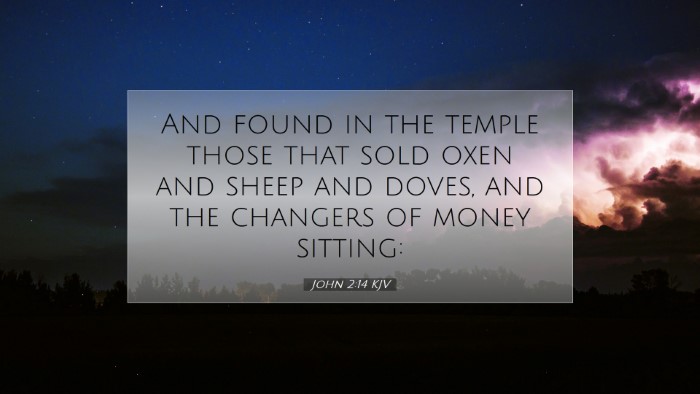Old Testament
Genesis Exodus Leviticus Numbers Deuteronomy Joshua Judges Ruth 1 Samuel 2 Samuel 1 Kings 2 Kings 1 Chronicles 2 Chronicles Ezra Nehemiah Esther Job Psalms Proverbs Ecclesiastes Song of Solomon Isaiah Jeremiah Lamentations Ezekiel Daniel Hosea Joel Amos Obadiah Jonah Micah Nahum Habakkuk Zephaniah Haggai Zechariah MalachiJohn 2:14
John 2:14 KJV
And found in the temple those that sold oxen and sheep and doves, and the changers of money sitting:
John 2:14 Bible Commentary
Commentary on John 2:14
Introduction
In John 2:14, we find a pivotal moment in Jesus' ministry when He cleanses the temple. This moment is significant not only for its immediate impact but also for its theological implications. Commentators throughout history have highlighted the various dimensions of this event, emphasizing Jesus' authority, the importance of worship, and the prophetic significance of His actions.
The Context of the Temple Cleansing
Before delving into the specifics of John 2:14, it is crucial to understand the context in which this event occurs. The temple in Jerusalem served as the center of Jewish worship and culture. It was a place of sacrifice and prayer, central to the lives of the Israelites. However, by the time of Jesus, it had become a place of commerce, as merchants and money changers occupied the outer courts.
Verse Analysis
John 2:14 (KJV): "And found in the temple those that sold oxen and sheep and doves, and the changers of money sitting."
- Commercial Activity: The presence of sellers and money changers indicates a significant shift from genuine worship to profit-making. According to Matthew Henry, this commercialization corrupted the sacred space, turning it into “a den of thieves.”
- Role of the Temple: Albert Barnes notes that the temple was intended to be “a house of prayer” (Mark 11:17), and the activities witnessed by Jesus were a direct violation of this intended purpose.
Jesus' Response: The Dramatic Action
Jesus’ reaction to the situation is both shocking and authoritative. He does not merely express disapproval; He takes decisive action to restore the temple's sanctity.
- Demonstration of Authority: Adam Clarke emphasizes that Jesus’ cleansing of the temple serves as a declaration of His divine authority and mission. His actions signal a new order in worship.
- Symbolism of the Act: The act of driving out the merchants symbolizes the cleansing of impure practices from genuine spirituality. This aligns with the prophetic tradition that often called for a return to true worship (Zechariah 1:14-17).
Theological Implications
The cleansing of the temple has profound theological implications that resonate through Christian teaching.
- The Nature of True Worship: Worship must be centered on God, free from commercial influence. As Matthew Henry asserts, “Worship is not about material gain but about spiritual devotion.”
- Jesus as the Fulfillment of the Temple: Further in the Gospel, Jesus refers to His body as the true temple (John 2:19-21), indicating that worship is now focused on Him, the living embodiment of God’s presence.
Applications for Today
This passage challenges contemporary believers to reflect on their worship practices and the spaces that support them.
- Examine Our Priorities: Churches today must guard against the encroachment of commercialism and consumerism. Albert Barnes reminds us of the importance of maintaining reverence and holiness within worship environments.
- Redefining Worship Spaces: The question arises: Is our worship genuinely centered on Christ? Adam Clarke encourages congregations to constantly evaluate their practices against the purity of worship Jesus demonstrated.
Conclusion
John 2:14 serves as a powerful reminder of the importance of maintaining the sanctity of worship. By cleansing the temple, Jesus not only restored its purpose but also foreshadowed the new covenant that would redefine the relationship between humanity and God. This passage encourages pastors, students, theologians, and Bible scholars to reflect deeply on the nature of worship and the necessity of purity of purpose in approaching God.


